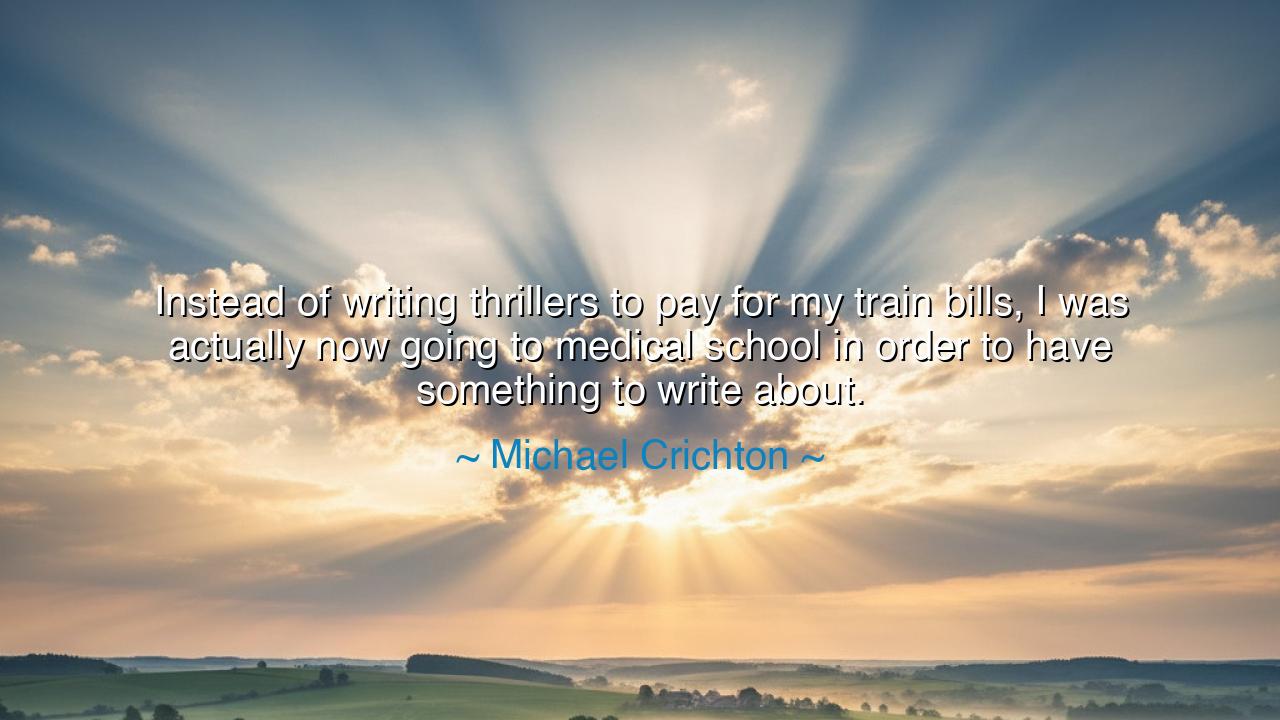
Instead of writing thrillers to pay for my train bills, I was
Instead of writing thrillers to pay for my train bills, I was actually now going to medical school in order to have something to write about.






The words of Michael Crichton—“Instead of writing thrillers to pay for my train bills, I was actually now going to medical school in order to have something to write about.”—resound with the voice of a man who understood that true art does not grow from comfort alone, but from immersion in the struggles and depths of life. In these words we hear the shift from necessity to destiny: from writing merely to survive, to living deeply so that one might write with truth, weight, and power. His message reveals a profound truth—that experience is the fountainhead of creativity, and without real encounters with the world, the imagination withers into shadows.
In this saying, Crichton unveils the sacred bond between experience and creation. To write only for the payment of bills is to produce words that may entertain but lack the pulse of reality. But to dive into the trials of study, the burden of knowledge, the drama of healing, and the awe of human frailty—that is to gather treasures from which stories can be forged that endure. His journey into medical school was not merely the pursuit of a profession, but the quest for deeper substance, for living truths to infuse into fiction.
This echoes the ancient call of the philosophers, who taught that the poet must first live before he can sing. Consider Homer, who wove tales of war and wandering that still breathe across the centuries. Whether or not he himself fought at Troy, his epics carried the fire of lived experience—either his own or that of a people who had tasted both victory and grief. Without such substance, no song, no story, no creation endures. Crichton, in his modern way, discovered the same truth: that to write powerfully, one must first live powerfully.
There is also in his words a subtle teaching on purpose. At first, his writing was driven by necessity—to pay the train bills. This is the lot of many who create: the struggle to survive, to wrest daily bread from art. Yet as he entered the halls of medicine, he glimpsed a higher purpose. Now he was no longer writing merely to live; he was living in order to write. His art was no longer the tool of survival but the fruit of existence itself. Here we see the transformation of vocation into calling, of survival into destiny.
History gives us another example in the life of Leo Tolstoy. He did not write War and Peace out of idle fancy, but out of years of witnessing war, grappling with philosophy, and wrestling with the meaning of existence. His novels endure because they are born of lived experience, not shallow invention. So too with Crichton, whose tales of science and medicine bore weight because they were rooted in the discipline, struggle, and wonder of his years as a medical student. His stories carried authority because they carried truth.
The emotional power of Crichton’s quote lies in its quiet encouragement to all creators: do not fear to live deeply, even if the path seems hard. The burden of study, the exhaustion of labor, the tension of uncertainty—these are not distractions from your art, but the very soil from which your art will grow. To escape hardship is to escape depth; to embrace it is to enrich not only your craft but your soul.
What lesson, then, can we draw? It is this: seek experience, not ease. Do not merely create to survive, but live so that your creation carries the stamp of truth. Practically, this means throwing yourself into challenges, learning new disciplines, traveling roads of difficulty, and engaging with the realities of others. The writer, the artist, the creator must first be the student of life itself.
Thus, Michael Crichton’s words are not only the reflection of a writer turned physician, but a teaching for all generations: do not write to live; live so that you may write. For in living fully—in work, in study, in hardship—you will gain something to share, something that endures beyond necessity and becomes the gift of wisdom to others. And in this lies the noblest calling of all creators: to transform life into truth, and truth into art.






AAdministratorAdministrator
Welcome, honored guests. Please leave a comment, we will respond soon